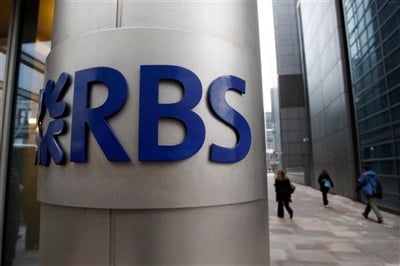Despite getting smaller, Royal Bank of Scotland still has some very big problems. Bad loans and a shaky economy top the list. Turning a profit? That's still a ways off.
Royal Bank of Scotland Group PLC, government-owned after being bailed out, reported a loss of 3.6 billion pounds for 2009 but beat expectations and said the peak of bad loans from the economic crisis may have passed.
CEO Stephen Hester, who along with his deputy waived any bonus for the year, cited improvements but said a "hard slog" lay ahead.
The loss compared to a 24.3 billion pounds loss, a British corporate record, racked up by RBS in 2008 following the disastrous takeover of the Dutch Bank ABN Amro. RBS wrote off 16.9 billion pounds in goodwill in 2008 related to ABN Amro and in RBS' NatWest subsidiary.
The analysts' consensus forecast was a loss of 5.7 billion pounds.
Revenue rose 34 percent to 31.7 billion pounds, up from 23.6 billion pounds in 2008. The bank booked impairment losses of 13.9 billion pounds for the year, compared to 7.4 billion in 2008.
RBS, which is 84 percent owned by the government after being bailed out during the worst of the credit crisis, said its operating loss shrank from 6.9 billion pounds in 2008 to 6.2 billion pounds.
In the fourth quarter, RBS reported a net loss of 765 million pounds, down from 1.8 billion in the third quarter.
RBS was the biggest casualty of the banking crisis in Britain, which also saw the government taking over mortgage lender Northern Rock and buying a 43 percent stake on Lloyds Banking Group.
"We have exceeded all the principal milestones we set for the first year of our plan. An 8.3 billion profit for 2009 in our core businesses provides evidence that the new RBS can deliver sustainable earnings," said Chief Executive Stephen Hester.
The "core" operating profit included 5.7 billion pounds from RBS' Global Banking and Markets investment arm, "which successfully took advantage of buoyant markets despite the handicaps of its own radical restructuring," Hester said.
"RBS is also becoming safer and smaller more quickly than we expected. We have already completed 70 percent of our planned balance sheet reduction. Most importantly, our customer base remains loyal as we implement the changes to our business," Hester said.
Hester said loan impairments of 13.1 billion pounds, compared to 6.5 billion pounds a year earlier, "may have peaked in 2009" but he cautioned that "2010 will be a year of hard slog, with limited visibility of our end value."
The pace of Britain's economic recovery and regulatory changes were key unknowns, he said.
Hester and Deputy Chief Executive Gordon Pell both waived their bonus payments for the year, but the bank won government approval to dish out 1.3 billion pounds to employees.
"On bonus payments for 2009, we were guided by a policy to pay the minimum necessary to retain and motivate staff who are critical to the recovery of RBS," the bank said.
RBS agreed in November to divest RBS Insurance, Global Merchant Services and its interest in RBS Sempra Commodities as a condition for joining the British government's asset protection scheme to insure the company against losses on 282 billion pounds of risky loans. It was also obliged to sell within four years its RBS branch network in England and Wales, and NatWest branches in Scotland.







